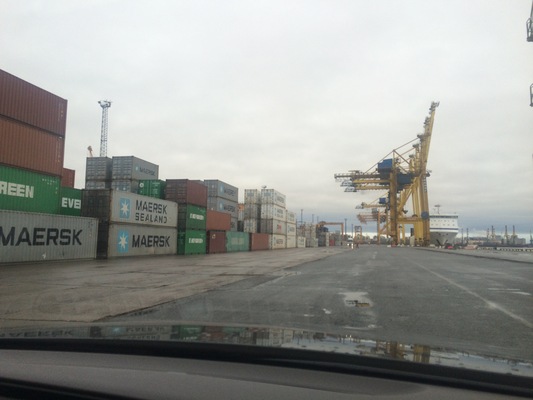- Russia’s economy is experiencing a full-scale economic crisis, brought about by a prolonged depression in oil prices, geopolitical turbulence and high corporate debt levels.
- Despite the gloomy economic outlook, many corporate management teams with whom Seafarer met are looking past the current downturn and investing counter-cyclically to take advantage of competitors’ weaknesses.
- However, even the best managed Russian companies face significant hurdles, including debt refinancing and access to affordable financing.
Russia is where one finds diamonds in the rough. I traveled there at the start of winter, with the seasonally appropriate gloomy outlook shaped by Western media. While in macroeconomic terms Russia is indeed living through a crisis, I found a confident people getting on with their lives without complaint. Within the context of Russian history, the Russian nation has endured worse hardship. It is this underlying strength that interested me, and I wondered whether I would find evidence of it within the management teams of companies I was going to meet.
I designed the trip to meet with companies that interested me for specific reasons. Thus, my comments do not necessarily represent my impressions of the economy as a whole. What I found among the management teams I met with is a razor sharp focus on the task at hand. In most cases this task consists of consolidating the sectors they operate in. Rather than being distracted and paralyzed by geopolitics, the decline in the oil price and the Ruble (the Russian currency), or the rise in inflation, management teams were focused on how to continue gaining market share despite these obstacles. In fact, it was uncanny how many of them viewed the economic crisis as an opportunity to actually accelerate their progression toward their long-term, strategic objectives. For example, one food industry firm I met with purposefully maintained a sensible financial leverage ratio despite having access to a subsidized cost of debt. As is more typical, its competitors fell for the temptation of a subsidized debt cost and over-levered their balance sheets. Now that the industry is undergoing a crisis, the prudent management team I met with is looking to acquire assets below replacement value.
This way of thinking – to embrace a crisis, and manage actively through it – is one of the most difficult mental hurdles for professional investors to overcome. Most investors attempt to avoid countries in recession, and tend to wait for confirmation that economic growth has resumed before investing again. The same behavior tends to apply to corporate management teams within these countries. And yet, here I found management team after management team acting in a manner atypical to the behavior of the common investor or company. In fact, another company I met – a retail operator – was accelerating its store expansion meaningfully, and had a clear vision of where it intended to be competitively three years into the future. Well-capitalized companies (and investors) able to make such counter-cyclical investments at a time of crisis often reap the greatest benefits from buying at fire sale prices.
Indeed, Russia is to some extent an anachronism. It is a large country with natural resources that has played a pivotal role in history, and yet many of its industries operate as if they had been frozen in time. There are companies in Russia that for at least a decade have used this opportunity to modernize the operating structure of their respective industries. The present crisis constitutes an acceleration of this process as weaker players are finally forced to exit the market. This process is the reason an investor or a company would continue investing in a country within the context of a recession. I consistently encountered this dynamic in my meetings. Admittedly, the reason for this consistency is most likely due to the targeted nature of my meetings; my observations are not representative of the economy as a whole. Indeed, one must be highly discriminating when investigating investment opportunities here: in the aggregate, the economy is shrinking, and there are many other companies retrenching their operations and investment.
It is important to note that the companies I met with still face significant hurdles. The most important of these is the refinancing of U.S. Dollar debt into Rubles. The second one is lack of access to affordable financing. Neither of these obstacles are insurmountable; it simply requires competent company management, and careful stock selection by investors. Indeed, this is not the first time Russia has suffered a foreign exchange shock, nor is it the only country to have undergone a crisis of this nature. One of the sad legacies of historical government mismanagement in Latin America is that management teams of the companies that have survived over the decades are very competent precisely because of the crises they have overcome.
In summary, within the “rough” of the Russian economy, there are diamond-like management teams with a robust historical experience, and a sharp focus on the future they intend to shape for their industries. Finding these qualities is the best possible outcome one could hope for out of an investment trip. And they were hiding in plain sight at the start of the Russian winter.
Paul EspinosaMoscow




- The views and information discussed in this commentary are as of the date of publication, are subject to change, and may not reflect the writer's current views. The views expressed represent an assessment of market conditions at a specific point in time, are opinions only and should not be relied upon as investment advice regarding a particular investment or markets in general. Such information does not constitute a recommendation to buy or sell specific securities or investment vehicles. It should not be assumed that any investment will be profitable or will equal the performance of the portfolios or any securities or any sectors mentioned herein. The subject matter contained herein has been derived from several sources believed to be reliable and accurate at the time of compilation. Seafarer does not accept any liability for losses either direct or consequential caused by the use of this information.
![[Chrome]](/_layout/images/ua/chrome.png)
![[Firefox]](/_layout/images/ua/firefox.png)
![[Opera]](/_layout/images/ua/opera.png)
![[Microsoft Edge]](/_layout/images/ua/edge.png)